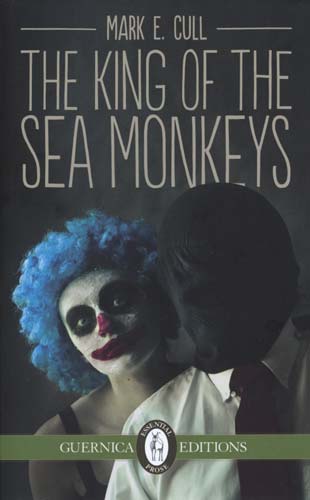The King of the Sea Monkeys
The King of the Sea Monkeys is a novel of two parts. The first part is about Paul, a young high school teacher, a loving father to Jessie and husband to Lilian. The second part is about Saul, whom Paul “becomes” after surviving a gunshot to the head upon being thrust into the middle of a gas station robbery. Wrong place, wrong time, and just like that, Paul becomes Saul. The King of the Sea Monkeys is a novel of two parts. The first part is about Paul, a young high school teacher, a loving father to Jessie and husband to Lilian. The second part is about Saul, whom Paul “becomes” after surviving a gunshot to the head upon being thrust into the middle of a gas station robbery. Wrong place, wrong time, and just like that, Paul becomes Saul.
This is the premise of Cull’s novel. The narrative ping-pongs back and forth from the present to the past, intertwining these two different lives of the same character. At times, this technique works, but at other times, this technique feels somewhat jarring, making it difficult to “settle in” with the moment that Cull is carving out for us.
The King of the Sea Monkeys is a novel about many different things: mental disabilities, family, morality, faith, religion, philosophy, and more—occasionally trying to incorporate too much. Heavy religious and philosophical passages and dialogue often creep abruptly into the narrative, no matter the tone of the scene up to that point; this effect often feels less like a smooth transition into multi-layered meaning, and more like a strange, unexpected dip in an otherwise steady carnival ride. At one point Saul wonders:
It seems to me that people who truly believe that order in the world can only exist because of God, because of the fear of the eternal consequences of doing wrong, they are moral time-bombs. It is not in their nature to be good. It is not a question of escaping punishment, the only thing standing between them and the money in the cash-drawer is damnation.
There is also the question of Lilian, Paul’s wife. She is only somewhat present in the Paul sections of the novel, often peripherally, serving as a sort of backdrop behind Paul and Jessie’s interactions (which are usually quite wonderful; the father-daughter relationship is powerful and effective, one of the strong points of the novel), and following Paul’s injury, Lilian bizarrely fades out of the story almost entirely, which is even stranger because Jessie’s role increases. Saul comments on Lilian near the end of the novel, saying that he “had no memory” of her, and that he doesn’t “like to think about women at all,” but for some reason his failure to acknowledge her also ceases her existence. This “hole” in the novel’s cast of characters is never explained.
Furthermore, I found it difficult to connect emotionally with Paul/Saul, which is odd, because many of the tools to generate sympathy from the reader are in place here—perhaps this is due, in part, to Saul’s somewhat lacking of emotion about his situation. His fragmented observations and thoughts quickly feel redundant and bland:
Things looked very different headed the other direction, and I didn’t recognize the exit near the restaurant. The bus even passed the hollow man before I realized it. I got off at the next exit and crossed the street again. I got off at the next stop with the hollow man. By the time I got to work I was more than an hour late.
The King of the Sea Monkeys has many of the elements for a potentially powerful novel. However, the novel is bursting with too many themes, and the time-jumping between the past and the present, between Paul and Saul, made this feel like Cull was forcing puzzle pieces together, like trying to fuse multiple stories together that never quite mesh properly.





